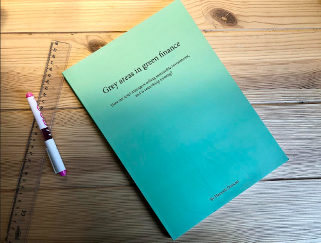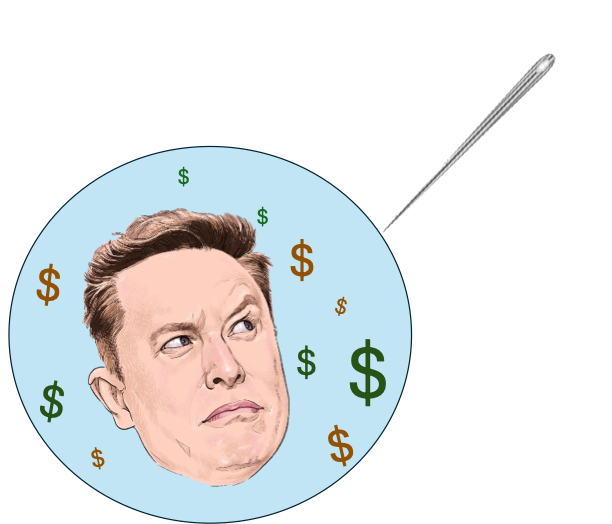Back in 2018, I wrote my masters dissertation on greenwashing in investment management. It didn’t start out like that. The research was meant to be about marketing sustainable finance. But what I uncovered was so damning, shocking, and devastating that it wasn’t just the paper that changed. My whole life turned upside-down.
For the first time I saw the truth. Banks greenwash. A lot.
I was still working in investment management then. I worked at BNP Paribas, a bank that has poured $165 billion into financing fossil fuels since the Paris Agreement.
Like thousands of others, I was unwittingly part of the greenwash machine. My speciality was writing award pitches. BNP Paribas won an accolade of Environmental Finance awards while I was there. I’d be typing late into the evening – just me and the office mice – squeezing a win out of every initiative. I even made t-shirts. “WHATS YOUR IMPACT?” was blazoned across them. And it wasn’t ironic. I jumped out of a plane representing BNP Paribas wearing that shirt.
I am still trying to come to terms with it. I feel like I was a f**king pawn in some twisted game. Now I am out of investment banking altogether. I scrawl article after article about greenwash. But writing only gets you so far. The world needs action.
Banks are addicted to short term profit
The OECD have made it painfully clear that we can reach our climate goals if we invest $6.9 trillion each year into low-carbon infrastructure. Our towns do not need to flood. Our forests do not need to burn.
Yet, the way banks think is unbearably short-term. They love quick and dirty profit. For them, oil is like the bad boyfriend they just can’t leave.
Since the Paris Agreement, 60 banks have handed over $5.469 trillion for fossil fuel companies to expand. If they had just said no – or at least attached some terms – the planet would be in a drastically better position. Maybe 33 million Pakistanis wouldn’t have been flooded out of their homes. Maybe 13 million West Africans wouldn’t be suffering severe hunger from droughts. Over the past year, sixteen banks, including my old employer BNP Paribas have increased financing. Lloyds Bank is another.
We have more than enough money to do the right thing. $40 trillion is invested in Environmental, Social and Governance (ESG) funds. That’s four times what’s needed. But the money is not being invested well.
10% of ESG funds, for example, contain BP. Imagine that… Fund managers gathered around a table and agreed that BP was a good company to include. Exxon Mobil and Shell too. Unsurprisingly, after years of soaking up our ESG investment, BP has now decided to “dial back” from it’s carbon commitments. I mean… What did we expect? It’s a petrol company.
What’s completely crazy is that we have everything we need to save the planet. We know how to make renewable energy; we have the funds to expand… It’s just that the banks won’t hand it over. They are too deeply embroiled with fossil fuel companies and maintaining the sad status quo.
Fintechs are breaking the cycle
Time is running out. As the IPCC puts it, there’s “a rapidly closing window of opportunity to secure a liveable and sustainable future”. We need a finance intervention. A fintervention.
Promisingly, there are services fighting to break this swampy greenwash hellhole. Investment platforms like The Big Exchange (a sister company to The Big Issue), CIRCA5000 and Triodos unapologetically reject short-termism.
They’re laser-focused on sustainability and making it easier for people invest in green infrastructure. The Big Exchange, for example has a button that I love. It’s called “filter for fossil free”, and in one click, not one penny of my money goes to oil companies.
Perhaps most importantly – to avoid greenwash – they are transparent. Some are powered by another fintech, Tumelo. It’s a platform that uses pass-through voting technology to give ordinary people a say on their own investments.
Of course, the weird anti-woke lobbies in the USA hate this kind of thing. The big banks hate it too. They’re vehemently protesting the INDEX Act. If they succeed, it would be a major roadblock to people like you and me having a say in our investments. Being able to chose where our money goes should be a right. But it’s becoming a privilege.
(Sidenote: Did you know that woke means to be “aware of racial and social issues”? … I have a theory that people who describe themselves as “anti-woke” didn’t research the definition).
Other fintechs approach the problem from a different angle. Recently, I spoke to another investment management survivor, Mais Callan. She’s created a Software-as-a-Service platform for institutional investors like pension funds to share data and boost sustainability. It’s an incredibly ambitious goal. But if her platform – Impactive – goes mainstream, £2.5 trillion managed by UK pension funds could (finally) be used to save the planet.
Green and sustainable fintechs like this are just a drop in the toxic investment ocean. They urgently need support and capital to power-up. But frustratingly, many struggle to get funding. I wonder how much of this is because often, they are founded by women. Despite creating 40% of fintech start-ups, women-led start-ups receive just 4% of UK VC funding.
Ripping off the green-tinted glasses
As another Earth Day (my birthday) passes by, we must force ourselves to recognise the mistakes we’ve made. The painful, humiliating, and agonising mistakes. It’s difficult. Really difficult. But we must.
Greenwash is scary because you truly don’t see it while you’re doing it. I was balls-deep in creating greenwash and I had no idea. My desk couldn’t have been closer to the energy traders. Hundreds of monitors screamed oil prices at me every day. But I was totally oblivious.
Most people working in banks like JPMorgan ($434.1 billion in fossil fuels since 2016), CITI ($332.9 billion) or Wells Fargo ($318.2 billion) probably have no idea either. If you’re someone who makes ESG marketing material for any of the 60 banks who fund fossil fuels, I’m sorry to say it, but you ARE part of the problem. Unless you’re sabotaging the trading desks or heckling the C-suite every single day, you’re a cog in the greenwash machine. And you probably can’t even see it yet.
That’s why we need new financial services. New faces. New thinking. It’s time to move over.




